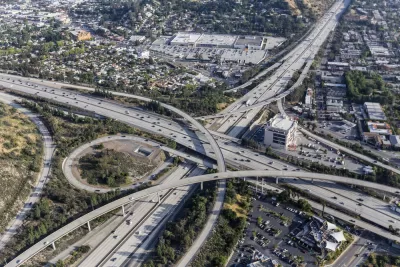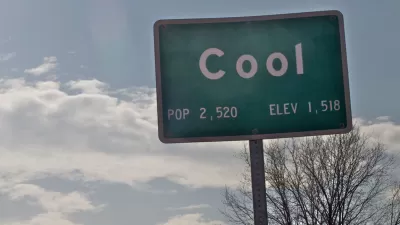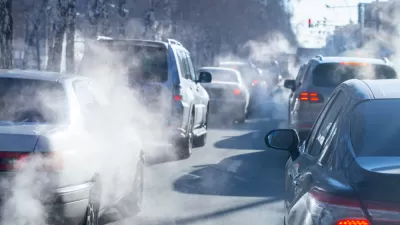There's good and bad news from an annual assessment on the Golden State's economy and environment. Gross domestic product per capita increases as emissions per capita decrease, with the major exception of emissions from transportation.

"Climate pollution from transportation hasn’t slowed since 2012 and now represents more than 40 percent of the state’s total, according to an annual assessment from Next 10, a San Francisco based non-profit," reports Eric Roston for Bloomberg News.
The figure represents a “worrisome trend” in a state that has achieved its overall 2020 climate change goal -- to push annual emissions below 1990 levels -- four years early.
“It has become clear that the transportation sector is heading in the wrong direction,” according to the report.
Roston writes that the report, called the 2018 California Green Innovation Index identifies the following reasons for the increase in transportation emissions:
- Californians have shown an increasing aversion to use public transit.
- Difficulty finding affordable housing near work means people have to drive more to their jobs.
- Lower gasoline prices are always greeted warmly -- but attract drivers to pick-ups and sport utility vehicles from more fuel-efficient smaller cars.
The good news in the report is the "long-term transformation in economic growth and energy use." Per capita gross domestic product (GDP) has been increasing while per capita emissions, notwithstanding what Roston calls the "anomalous transportation numbers," decrease. He ends his article on a grim note:
The slide in transportation emissions sullies the popular image of California as the clean-tech-savvy home to Tesla Inc. and 8 percent of the world’s on-road electric car fleet -- equal to the rest of the U.S.
Focus appears to be on tailpipe emissions, not vehicle miles traveled
Roston sees the state's failure to reduce transportation emissions as one reason it has to resist the Trump administration's attempt to revoke the Clean Air Act waiver that allows the state and 12 others to adopt stricter standards than apply for the rest of the nation due to its poor air quality.
The upswing in transportation emissions has not gone unnoticed by Sen. Kevin de León (D-Los Angeles), author of a landmark bill sitting on the governor's desk that requires the state's utilities to generate 100 percent carbon-free electricity by 2045.
"De León, who is challenging Sen. Dianne Feinstein for her seat in Washington, said the next Legislature will have to address tailpipe emissions," reports David R. Baker for the San Francisco Chronicle.
Related post:
July 20, 2018New York Times climate reporter, Brad Plumer, comments on California's landmark accomplishment in reducing emissions, observing that with the low-hanging electricity generation fruit picked, reducing transportation emissions will prove formidable.
Hat tip InsideClimate News.
FULL STORY: California Car Emissions Rise as Trump's Cuts to Standards Loom

Alabama: Trump Terminates Settlements for Black Communities Harmed By Raw Sewage
Trump deemed the landmark civil rights agreement “illegal DEI and environmental justice policy.”

Study: Maui’s Plan to Convert Vacation Rentals to Long-Term Housing Could Cause Nearly $1 Billion Economic Loss
The plan would reduce visitor accommodation by 25% resulting in 1,900 jobs lost.

Planetizen Federal Action Tracker
A weekly monitor of how Trump’s orders and actions are impacting planners and planning in America.

Wind Energy on the Rise Despite Federal Policy Reversal
The Trump administration is revoking federal support for renewable energy, but demand for new projects continues unabated.

Passengers Flock to Caltrain After Electrification
The new electric trains are running faster and more reliably, leading to strong ridership growth on the Bay Area rail system.

Texas Churches Rally Behind ‘Yes in God’s Back Yard’ Legislation
Religious leaders want the state to reduce zoning regulations to streamline leasing church-owned land to housing developers.
Urban Design for Planners 1: Software Tools
This six-course series explores essential urban design concepts using open source software and equips planners with the tools they need to participate fully in the urban design process.
Planning for Universal Design
Learn the tools for implementing Universal Design in planning regulations.
Caltrans
Smith Gee Studio
Institute for Housing and Urban Development Studies (IHS)
City of Grandview
Harvard GSD Executive Education
Toledo-Lucas County Plan Commissions
Salt Lake City
NYU Wagner Graduate School of Public Service




























